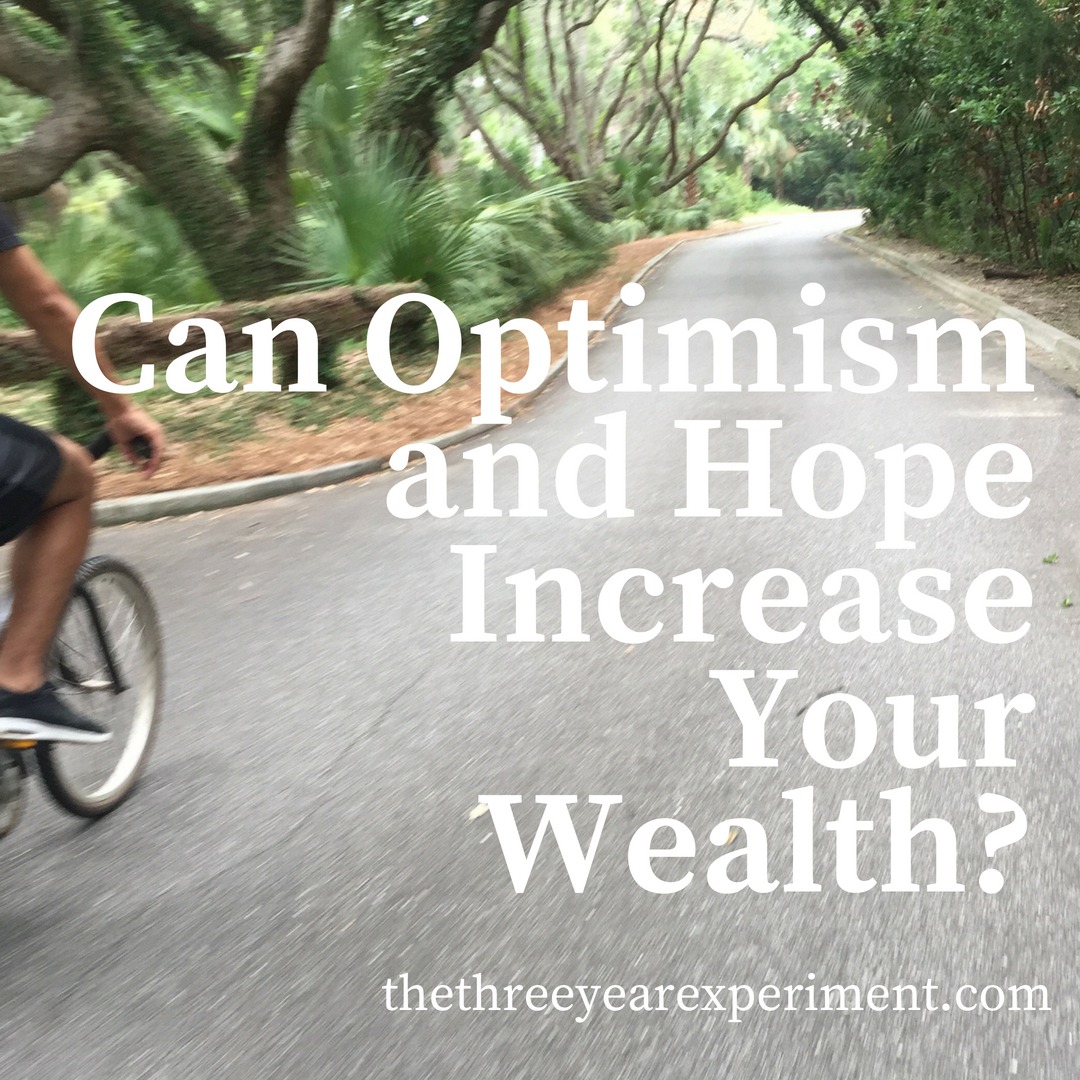This post contains affiliate links. Please see my full disclosure for more information. Thanks for supporting the blog!
Is it possible to increase your net worth through optimism and hope? Last week, I was listening to this episode of the Australian All in the Mind podcast featuring American positive psychologist Martin Seligman, speaking on the power of positive psychology and optimism in changing our outcomes.
One of the reasons I was drawn to this podcast was because Seligman is an academician. He’s interested in quantifiable research in neuroscience that psychologists can use to improve people’s outcomes, that is, their happiness levels. Seligman is the Director of the Penn Positive Psychology Center at the University of Pennsylvania and is widely known as the founder of positive psychology (here’s a TED talk he did from 2004).
In the podcast, Seligman shares how early on in his career, he realized that his colleagues were focused on the alleviation of misery and suffering, but he was interested in how to increase happiness: “I said, look, when you lie in bed at night you are generally not thinking about how to go from -8 to -5, you’re thinking about how to go from +3 to +6 in life. Psychologists have never worked on this, we’ve never worked on happiness, well-being, the stuff that is above zero.”
It became his mission to figure out how to teach optimism.

One of the tools he used was cognitive behavioral therapy. Cognitive behavioral therapy teaches you to retrain your brain. If you’re a catastrophizer, always thinking the worst about any given situation, you learn to reframe your thinking with CBT: “That woman cut me off in traffic. It’s not because she’s out to get me, it’s probably because she’s late to work and/or not paying attention.” Or, “I’m sure the reason my boss hasn’t written me back is because she’s working on that huge project that’s due on Monday, and not because she’s disappointed in something I’ve done.”
Research has shown that with enough CBT, you can eventually change a pessimistic view of the world, where you think of the bad things that happen to you as pervasive, permanent, and uncontrollable (“My friends won’t sit next to me in the cafeteria. It’s because I’m a horrible person and nobody likes me”) to seeing bad events as temporary, contained, and related to other people or outside circumstances (“Oh, my friends are having a volleyball meeting and I don’t play volleyball. That’s why they’re not sitting with me today”).
Seligman and his fellow psychologist researchers have found that, over the course of decades, having an optimistic attitude about life produces better health outcomes.

But can optimism produce better WEALTH outcomes? The New York Times thinks so. In this article published last Friday, Seema Jayachandran, a professor of economics at Northwestern, makes the case that having a sense of hope about your financial future can improve economic outcomes for people living in poverty.
The idea is that having optimism and hope encourages people to work harder through an improved mental health state and ultimately, earn more money. “While poverty can induce hopelessness, setting off a vicious cycle,” she writes, “modest interventions that instill a sense of hope [like micro-lending] can sometimes lead to remarkable improvements, recent research shows.”
Having hope for the future is not just a woo-woo concept espoused in The Secret. It’s been quantifiably shown to improve people’s financial situations.
But what about if you’re not in poverty? Most of us are aware that after we reach $75,000 in annual income, more salary doesn’t bring us more happiness.
But could general optimism about your financial future be subconsciously fueling you to work harder or do things that will improve your financial state?
For our family, that’s certainly been the case. When we launched our plan to become location independent two years ago, we became laser-focused and excited about leaving New Hampshire. Feeling more hopeful about our financial future meant we spent more time engaged in activities that made our money grow, like saving and investing.
I’ve put together this quiz for you to measure your own optimism and hope levels. Take a few minutes to answer the following questions:
The Quiz
- I anticipate retiring:
a. at a specific date X years in the future. I have a plan and I’m following it.
b. one day but I’m not 100% sure when or how.
c. a long, long, time from now. It feels like never but I know I’ll eventually get there because I’m working to get out of debt and save more.
d. never.
2. When it comes to paying my bills:
a. Everything is paid automatically and on-time. I never worry about having enough to pay my bills.
b. I almost always get my bills paid on time but occasionally I worry about when my paycheck will hit my bank account.
c. I worry a lot about paying my bills but I currently have a plan to pay down my debt or save up money to make things better in the future.
d. I usually worry about how I’ll get all my bills paid in any given month. There never seems to be quite enough money no matter how much I make.
3. My emergency fund:
a. is fully funded with 3-6 months of living expenses or more.
b. is currently growing because I’m adding to it each month even though it’s not yet fully funded.
c. will eventually be fully-funded even though right now I have other financial priorities.
d. is non-existent.
4. Here’s how I feel about debt:
a. I avoid debt. I currently have no debt or only mortgage debt. I tend to buy things with cash.
b. Debt is a tool that I leverage to buy more. I can comfortably make my debt payments.
c. I have a lot of debt but one day I will have it paid off.
d. Debt is hanging over my head and weighing me down. I can’t eliminate my debt no matter how hard I try.
5. My house:
a. is largely paid-off or is a very small percent of my total net worth.
b. is comfortable for me financially. I can easily pay for rent or mortgage and associated expenses.
c. is a big part of my monthly payments and it’s probably too expensive.
d. is constantly changing. I move a lot and never know where I’ll be next.
6. My income:
a. provides me with enough money to fund my wants and needs, plus save and invest.
b. is enough to cover the basics, with some left over, if I’m careful.
c. is low but I have a plan to increase it.
d. isn’t enough. I have a hard time making ends meet.
7. For large future expenses, like my kids’ college fund:
a. I am on track to fully fund it.
b. I know how much I need to save and I’m working on it although I have a long way to go.
c. I know how much I need to save but I’m not sure right now how I’ll save for it.
d. I can’t think that far ahead.

8. When I think about budgeting:
a. It makes me feel in control.
b. It’s not something I love to do but I realize its importance and do it.
c. I’d like to do it someday.
d. It makes me feel panic deep in my stomach.
9. If a large, unexpected expense, like a car repair, comes up:
a. I pay for it out of my savings. No sweat.
b. I use my emergency fund or another stash of money and will pay myself back over time.
c. I put it on my credit card and pay it off when I can.
d. I usually have no idea how I’ll pay for it.
10. I would characterize myself as:
a. a saver. I have plenty of money because I spend less than I earn.
b. a bit of a spender, but I have been able to save money over the years.
c. a reformed spender. I got myself into financial trouble but I’m working on getting out of it.
d. Getting by. I rarely feel like I have enough money for all the things I need and want.
The Results
Tally your numbers. If you picked:
Mostly As: You are in a financially secure position. Chances are, you feel quite hopeful about your financial future. You likely have growing savings and investing accounts and worries about money don’t keep you up at night.
Mostly Bs: Your financial situation is improving, but you may still have some money worries. In general, you feel optimistic about your finances, even if you’re not 100% where you want to be financially.
Mostly Cs: You may be in debt, or just starting on the road to better financial habits, but you feel hopeful about the future because you have a plan. Even if it takes you a decade to get out of debt, you know you’ll eventually get there and start saving and investing for your future.
Mostly Ds: Your financial life isn’t what you want it to be. It could be a series of bad breaks, bad choices, or rotten circumstances, but you’re floundering with your money. You feel hopeless and don’t know what to do about improving your money situation.

Now, one note on my highly scientific quiz. The New York Times article was quite clear that people who felt hopeful about the future of their money were currently in poverty. Your financial state doesn’t necessarily correlate with your hope levels. While having your financial house in order is probably, but not always, an indicator that you’re optimistic about your financial future, it is possible that you have a lot of money but still feel nervous or pessimistic.
It’s also possible to be a financial mess but feel optimistic that things will change. That’s why Category C exists: it’s for people who don’t currently feel very good about their financial situations but still feel hopeful. They either have a plan to get themselves out of a bad financial situation or feel hopeful that they’ll figure one out soon.
What is Hope?
Hope, or an optimistic attitude, generally springs from feelings about the future. So it involves planning, which we as humans naturally do all the time. That’s why we’re given the advice, “be present. Stay in the moment” so often. We are almost always ruminating on the past or planning for the future.
Hope, it turns out, is activated in our brains when we achieve mastery, when we anticipate having control over something. This cluster of cells found in the ventral medial prefrontal cortex of the brain, which Selegman describes in his book The Hope Circuit: A Psychologist’s Journey from Helplessness to Optimism, turn off the dorsal raphe, the part of our brain that makes us shut down, or feel helpless.
So it is achieving mastery, or attempting to achieve mastery, having control, and having the belief that in the future, good events will outweigh bad events, that explain our levels of hope and optimism.
The GREAT news is that optimistic thinking can be learned. If you currently feel pessimistic when you think about your money situation, your brain can be retrained. And it’s by changing the way you think about money that will eventually change what you do with money, changing your financial future.
What was your score on the quiz? Would you categorize yourself as optimistic about your financial future?


Fabulous post! I love this topic of positivity changing lives. I think it has a bit to do with the victim mentality; feeling like you have no control over your future makes you feel hopeless and want to give up. But if you have a view that your choices matter, that you can impact your future through your present actions, then hope springs up.
And of course, there are plenty of people who seem to have been dealt an extra tough hand. But I think if you generally lean towards a positive, my-actions-matter kind of perspective, you’ll be better off than with a pessimistic attitude.
Cute sad pic of little ThreeYear, by the way!
Thank you Mrs. COD! That’s a really good point–mastery and the sense of control give you the tools to keep you from feeling like a victim in your own life. Little ThreeYear is really good at that pouty face. Youngest child!!
i’m very positive about money and a likely good outcome for that. i’m a cynical curmudgeon about a lot of other things, like the future of the english language in the age of twitter and dining from wooden planks instead of plates. are we all doomed?
Haha and table manners! And walking on furniture. We were talking last night about how our kids are allowed to do things we’d get sooo in trouble for! The relaxation of the culture, argh! 🙂
I love posts about how outlook can drive outcomes. The one thing I’d point out is the quiz doesn’t work for all questions just on the whole. Ie you can be very financially responsible and still use debt as a tool. You can use debt for emergencies. You can even not budget. Do all of them together with other items from your list though and it’s more likely you have an issue.
Good point, FullTimeFinance. The quiz definitely has some drawbacks. I also recognize that you could be terrible with money but still really optimistic, although I’m not sure if that counts, since it would be a heavy bit of self-deception. But I actually don’t think that matters. To your point, though, being overall quite strong with your financial life is probably a good sign.
Yes a wonderfully put together post! Most people think we’re in the answer A camp but some parts we’re leaning towards the answer B camp. But I’m lightyears higher than when I was in the C and D (mostly D) camp. I think I have a queer-er word for it which is basically the “compounding of dreams.” Once one of your dreams pop and comes true, you work on better ones, higher up higher up as one goes…until one day you’re Bezos and has his own rocket ships. LOL!
I’m in B camp a lot too. I don’t think you ever get to the place where you feel like you’ve “arrived” with your money, so maybe picking B is our answer to that (well actually mine is because we’re still “arriving”). You know, that’s a really good way to describe it-I’ve heard it described as the Matthew principal–basically, to he who has a lot, more will be given.
Really good post, well though out too.
I really liked the part where microloans to the poor can make them more optimistic. I.E giving that car wash guy at the petrol station an extra 20 pesos and him being truly grateful as that money would buy him half a kilo of rice! Prior to that he was thinking about how poor he was.
I loved that article too. I think we underestimate what a small act of kindness or a small bit of money can do.